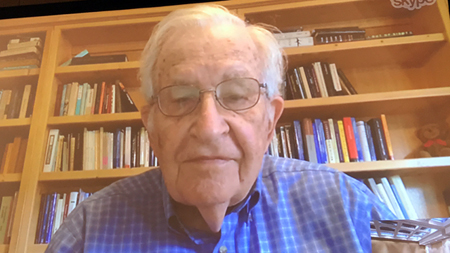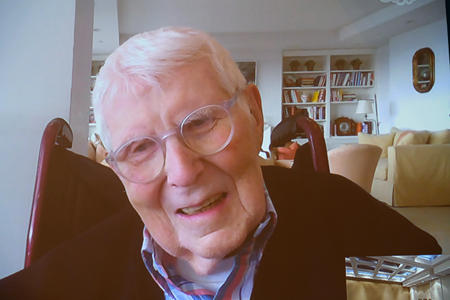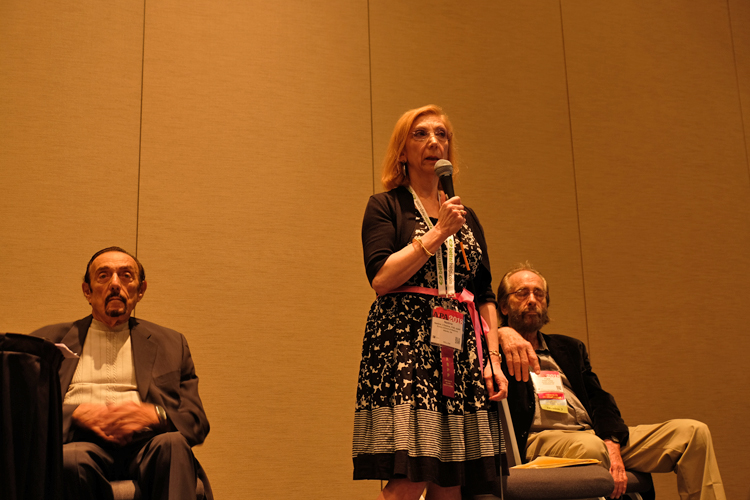American Psychological Association
126th Annual Convention
San Francisco, California, August 9-12 2018
Note: This is my 20th year of presenting these reports, originally in near real-time in daily 'list' posts which were widely subscribed, but increasingly web-based as list-servs gave way to instant texts, interest/Pinterest groups, and whatever flashes across the screen - in this age where attention span, focus, and reasoning are said to rival that of a goldfish. That said, if you are still reading: Enjoy, reflect, discuss, and share. ('Giving psychology away!')
Noam Chomsky in Conversation with Frank Farley

Noam Chomsky, Ph.D.
Dr. Noam Chomsky was introduced by Dr. Frank Farley as "truly one of geniuses of the 20th and 21st century", known for his work in linguistics and neuroscience, along with his observations about society. Farley noted this event is sponsored by
Division 3 of APA, which is the society for experimental psychology and cognitive science, 'a very historic division'....
Following the warm introduction, Chomsky (on interactive big-screen) greeted the audience and Dr. Farley started things off.
But first, the bad news: At best the audio was loud and clear for moments at a time, but for much of the hour, what we heard competing with Dr. Chomsky were loud bangs, whistles and echoes, with generally muffled sound, and out of sync with his lips. Even under perfect circumstances Chomsky's expositions can demand full attention to every word, so... After days of painstakingly listening to audio clips and comparing it with written notes, in the interest of fairness and 'best effort' I've decided to provide only those snippets of discourse where I have enough of Chomsky's own words, with minimum input or interpretation. It's a bit like a loose connection at times, I'm afraid, but hopefully you'll get a sense of the main themes and a few interesting ideas put forth here by Noam Chomsky.
How we fill in the gaps is probably a bit like a Rorschach. But a few segments were audible, clear, and as sharp as the reasoning. Here's a sampling. Have fun...
~~~
**Disclaimer** Neither I nor the APA is endorsing or condemning any particular entities, groups or individuals. These are the opinions and words of Noam Chomsky, pioneer in linguistics and cognitive science, shared for educational and historic purposes.
~~~
Farley began by asking about the well-stocked book shelf behind Chomsky and asked what Chomsky has been reading lately, of note. Chomsky was particularly absorbed by one book in particular, something which involved a 1000 year war...
Farley: So what have you been doing recently - writing about, thinking about?
Chomsky: "The usual...One hemisphere is agonizing about the fate of the world....
The other thing, I'm working on a very striking idea about the the nature
of language... "
putting these ideas forward and getting feedback on a virtual community.
Farley: "I wonder if you could share some views on some important [concepts like]
authority, anarchism, cooperative society, things like that..."
Chomsky began with a discussion of what he called 'the three centers of capitalism'.
Chomsky: "Let's take a look back... A lot of what's happening in the world now, the anger and fear, the destruction of institutions... [are] policies that are the manifestation of the period... A lot of that is the consequence of choices, decisions made during the 1970's.
It's worth remembering the activism of the 70's was very promising...."
Chomsky highly recommended a book from 1965 called
The Crisis of Democracy*, "...a book about a group of intellectuals from
'the three centers of capitalist democracy'..."
[*Available on Amazon, as of this writing, used in paperback, for $400, but reportedly available free as a .pdf document. "The vitality of democracy in the United States in the 1960s produced a substantial increase in governmental activity and a substantial decrease in governmental authority." -Samuel P. Huntington (1 of the 3 authors)]
[ Unintelligible -
BANG! BANG! BOOM! ]
"The book is very interesting. It's written in a kind of measured tone... focused on how...
notably vast and apathetic sectors of the population, like the women and the young, the old, the farmers and workers, other people... just living normal lives, not bothering anyone; They were never in the political arena to try to press for their demands... and that was causing a crisis because there was too much pressure on the State.... doing some really ugly things, led by a group called the 'Values Selectionists' [?] ... aiming to influence institutions
... responsible for the indoctrination of the young,
universities and so on....
This was accompanied on the right by a comparable assault.
This is famous, worth reading... a book by [Powell?],
on 'corporate rights': It calls on the business community
to stand up and defend themselves against the assault on business rights led by 'crazed' people
like Ralph Nader... who challenge the power and legitimacy of business institutions. 'We have the money'..."
"How did this change the significant conditions?
You may recall that Margaret Thatcher said famously, that 'there is no society, just individuals'... paraphrasing"
[Unintelligible segment]
"And that's a big part of neoliberal reaction... this policy is known to
... sharply intensify wealth while the rest of the population basically went backwards....
The people recognized correctly that they're just not represented. A large majority of the population since Reagan years [has asked],
'Who runs the country?' The answer is: A few big interests looking out for themselves....
All of this leads to disillusion and anger,
... breakdown, undermining accommodation and solidarity. It's accompanied by major attacks against the fundamental institutions which allow individuals to protect themselves, primarily unions.... The right to be represented.
The people are being harmed by provision of the harsh anti-labor in the United States, particularly 'right to work' rules .... [echoing the] 19th century ... Republican Party. Slavery...and so on...
And now ...
Farley asked the same question he had earlier asked Aaron T. Beck:
QU: "If you were invited to the White House to dine with President Trump, what would you want to chat about?"
Chomsky: "I'd tell him that he's actually doing very well. He's very successful in carrying out the program - that is his program and that of the extremist right-wing Republican party that he's part of - that he has succeeded in his main goal of focusing media on him and his antics.... And while he's doing that his associates in Congress are carrying out some of the most savage programs in recent American history... egregious.... like taking children away from their parents, taking food stamps away from mothers with dependent children..."
Chomsky referenced a study -
independent and bipartisan - that estimated the Trump budget ended up "giving a trillion dollars to the very wealthiest part of the population... [and it] takes away about a trillion dollars, from Medicaid, Medicare, Social Security, Aid to Dependent Children, food stamps and so on....
Filling the overstuffed pockets of the extreme wealthy, imposing further suffering on the population... and setting up stagnation for the next 30 years."
In all that, Trump has been 'successful' - and all with the "fervent support of his popular base... Impressive achievement."
Trump, in Chomsky's view, has in fact "been threatening the existence of the earth - the survival of organized human society... and that's the proper term to use for his 'policies' on global warming. I talk often about the severe and existential threats - of global warming ... environmental assaults... federal deficits ... sea level....He has turned the United States into a complete pariah, violating international obligation, pulled out of the Paris negotiations - the only country in the world that is not making some effort to deal with its nation's crisis at a federal level
.... maximizing use of fossil fuel ....
"What's happening... I don't have to explain. He knows well... It's easy to demonstrate....
He recently applied in Ireland for permission to build a huge wall to protect his golf course in Ireland against the sea level's rise,
a credible threat from global warming.
So he and his associates, including the more respectable ones like Rex Tillerson...
They all understand perfectly well that they're driving global destruction and they're doing it for the purpose of maximizing profit and power.
Evil doesn't describe it... There's just nothing like it....
We cannot sanction this.... conscious, knowing what to do to undermine the prospect of organized human life....
There's been nothing like it in human history. Never!"
[Boom! Boom! Sleigh bell sounds, several minutes]
"We live in amazing times. Maybe psychologists can figure out some account of what's happening to the intellectual elite in the human species that has enabled this. I can't.
Those are the kind of things that should be told to the general public, not to Trump...
Misguided... Not speaking truth. You have to speak truth.
People who think: You have to speak truth to power! We all should."
[Big applause]
On Language
Farley:
I wonder if we could touch on a different topic: language. One interesting question is... Given modern advances and discoveries in neurology,
have you sort of adjusted your conceptualization of language acquisition?
Anything along those lines?
Chomsky: "The work in neuroscience is quite interesting for its promise
but we have to remember something:
It's extremely difficult, amazingly difficult to try to discover the neural basis for even the simplest activity.
I mean: take, say, bees.
The perfect experimental subject ... short gestation period... A perfect example...
What do we know about the neuroscience of the amazing navigational capacities of bees? Virtually nothing. It's too hard.
What do we know about the evolution of things like bee communication? Essentially nothing.... [there are papers but] What do we know about the evolution of language?
There's a library full of books with the answer but we can't [fully understand the phenomena of] .. a small insect.
So going back to your question, the work on the human brain is not only vastly more difficult because of the complexity ... but it's also an improbable area of experiments because of ethical reasons.
So as we all know... [in such research on animal communication] it was considered imperative to do experiments with cats and rodents... [now] you can't do that....
Well you can't explain language [adequately, with regard to bees].... it's a very hard topic.
[Unintelligible - reference to 1950's- 1960's studies; 'real efforts to address structural construction, grammar and syntax'.] Then Chomsky turned to focus on the 'linearity' of language and word use in sentences.
Chomsky: How language rules are abused
One thing [seen often are errors ] ..."in
reversing the rules of language.... [not just looking at the linear] ...looking at the structural properties...
To take a perfect example, you have a sentence like 'the man and the boy are here'... it's are, not is, you don't look at the relation, [it's] the phrase...
Consider the sentence.... 'Eagles that fly instinctively swim'. It's ambiguous: They 'fly instinctively' or they 'instinctively swim'.
Put the adverb in front, instinctively equals fly and swim .... And it means they swim instinctively. That's more remote. It ignores the closest word. 'They instinctively fly' and swim....
...
Structurally, it's not limited... In effect all language, all construction, follows the computational rules of language syntax.
Pay no attention to the words, but pay attention to the structure.... We're beginning to understand [how this happens in our heads in daily life] "
[STUDY on structural properties - Inaudible]
2 groups... correlated with linguistic, focus on 'closed components' [think PEMDAS! Mathematical rules... ]
To answer your question again, there are things that can be discovered, but it's very difficult.
Farley: How does your research in linguistics and cognition/cognitive science influence your work in politics and philosophy?
Chomsky: Philosophy, yes. A lot of this concern comes out of philosophical questions... In politics it's very simple. There are some various acts underlyng language [concern for]
the fundamenal capacity for creative, independent
activity, which is what underlies the language's effect.... and it's also an
ideal to be pursued, the
social and political... there's no palpable thing ... they act as a sort of a common line... the question is very striking.
Farley: "One last question: All of us in this room live online. Is that phenomenon - which is certainly worldwide at this point... Is it potentially leading to changes in thinking - how we think, how we solve problems, how we conceptualize the world? Do you have any thoughts about that broad topic?"
Chomsky: "It's all very valuable... I spent much of this morning in discussion with friends & colleagues in a virtual community where people interact... pick up the foreign newspapers, read articles, a study on the trillion dollar economy that [begs for] engagement... So there are a lot of positive things. There's a lot of great harm, I think we see all the time... we see kids walking around holding up devices... aversion to looking things up in a book, studies suggesting some role in depression... and disconnection..."
[Inaudible - Describing common memes about connection/disconnection - like this - depicting people 'together' but ignoring the here & now people and events in front of them, in favor of an exclusive focus on their ubiquitous 'smart phones'.] " 'Sitting for a meal' ... at a table, having a hamburger,
having a conversation, one 'in conversation', the other [focused on a device screen] ... "
Chomsky cited the research which suggests, be it Facebook or other on-demand 'social' immersion, some relationship to feelings of depression and isolation. "People become trapped... and it's
very seductive... a sense of friendship ... from a trivial interaction." [MF: Recall the revelation that 'On the Internet Nobody Knows You're a Dog!', the Internet 'Newbie' phenomenon, old-fashioned 'peer presure', etc.] Research rightly is focusing on effects of overuse - depression, suicide... with many people
"trapped in a very seductive system".
Q: You're 89 years old. Will you agree to join us next year?
A: Sure thing, if my wife agrees to set it up!
~~~~~~~
![[color line]](http://www.fenichel.com/moveline.gif)
Conversation with Aaron T. Beck at 97 ![[New]](http://www.fenichel.com/new4.gif)

A look back at his celebrated career, the power of cognitive distortion, aspiration and humanistic/cognitive approaches with schizophrenia.
Plus advice for psychology students and early-career therapists. [Click/tap on image for report]
The 'Goldwater Rule': Moral and Ethical Dilemmas in the Age of Trump![[New]](http://www.fenichel.com/new4.gif)

Philip Zimbardo, Nadine Kaslow, Frank Farley
Past-Presidents of the APA discuss the issues surrounding diagnosis, duty to warn, moral responsibility, the costs of remining silent, and ways of moving forward and influencing policy.
Adam Alter on our "Irresistible" Screens ('Device Devotion')![[New]](http://www.fenichel.com/new4.gif)

Adam Alter, Ph.D.
![[color line]](http://www.fenichel.com/moveline.gif)
2010 Convention Highlights:
Online Support Groups & Applications |
Evidence & Ethical Practice | Opening Ceremony | Sir Michael Rutter: Resilience
Group Memory | Psychology in the Digital Age | Steven Hayes: What Psychotherapists Have that the World Needs Now
2011 Convention Highlights:
2011: eHealth Odyssey | Googling, Twittering, Poking | Zimbardo: Reflections + Enduring Lessons from 40 Years Ago: Stanford Prison Experiment
Opening | Avatar-based Therapy |
Canine Cognition: Chaser | Aaron T. Beck @90
| Cavanagh: Computerized CBT | Seligman: Flourish
PsychTech: Virtual & Augmented Reality |
Relationships 3.0 | POKE ME: Social Networks & Kids | Telehealth & Telepsychology Licensure - Barriers and Possible Solutions
2012 Convention Highlights:
Transmedia Storytelling |
Opening | 2012: Virtual Reality Goes to War
| DSM5: Q&A | Drew Westen: Dysfunctional Democracy
Howard Gardner: Multiple Intelligences
| Zimbardo: Anatomy of a TED Event
2014 Convention Highlights:
Opening Ceremony | Phil Zimbardo on Heroism vs. Evil | Aaron T. Beck at 93 | David Mohr: Technology for Better or Worse | Temple Grandin: All Kinds of Minds
2015 Convention Highlights:
Aaron T. Beck - On Humanism, Therapies, and Schizophrenia | Albert Bandura: Efficacy, Agency, & Moral Disengagement
| Danny Wedding: Psychopathology & Psychotherapy in the Movies | Phil Zimbardo on 'The Stanford Prison Experiment'
![[color line]](http://www.fenichel.com/moveline.gif)
![[Current Topics in Psychology]](http://www.fenichel.com/back.gif) CURRENT TOPICS Cyberpsychology APA 2000 2001
2002 2003 2005 2006 2007 2008 2009 2010 2011 2012 2014
CURRENT TOPICS Cyberpsychology APA 2000 2001
2002 2003 2005 2006 2007 2008 2009 2010 2011 2012 2014
Current Topics in Psychology Copyright ©1996-2018 Michael Fenichel
Last updated: Wednesday, 31-Oct-2018 20:46:21 EDT





